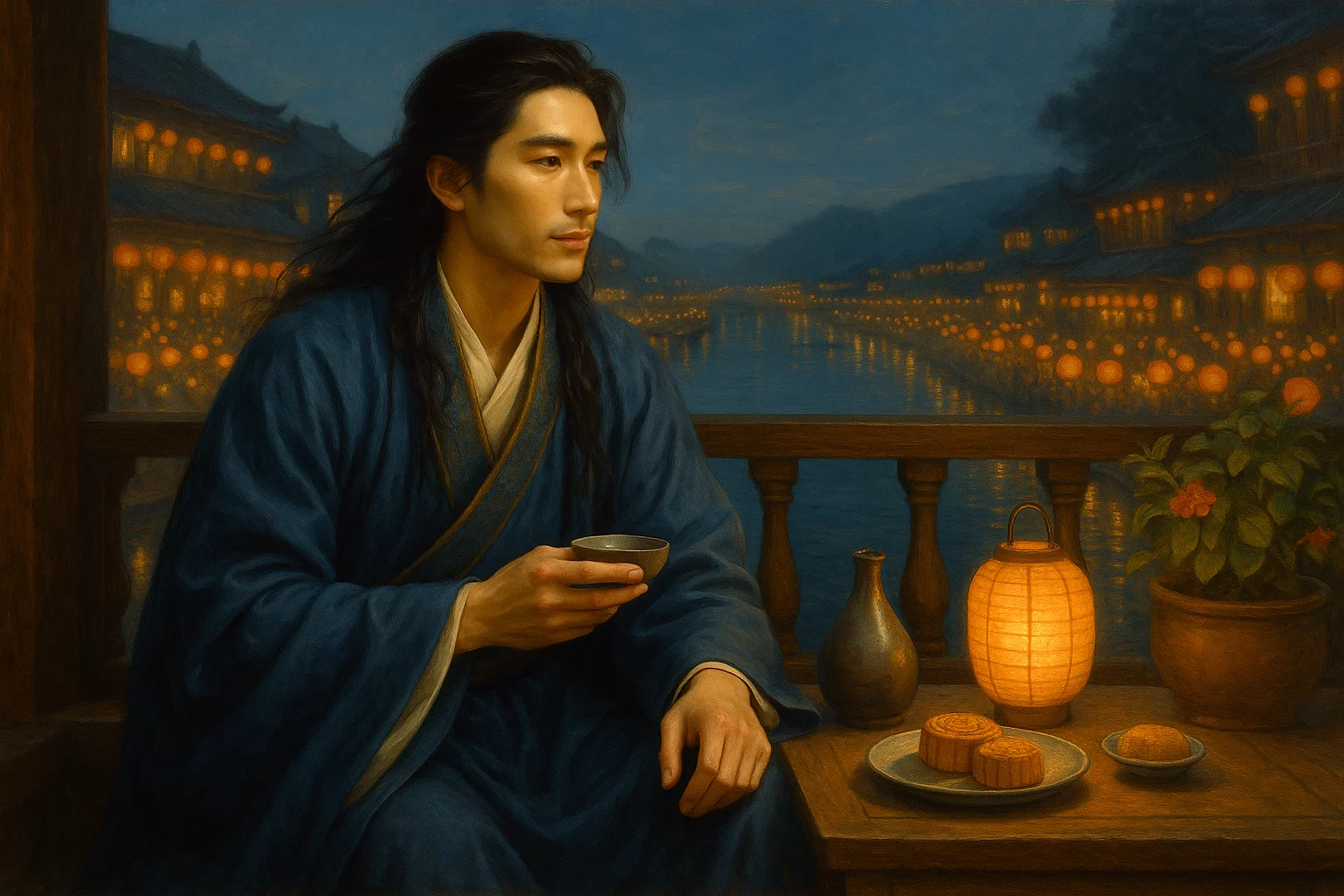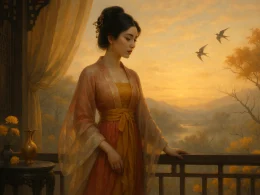Wind exhales through twigs,
Black punctuation marks disperse.
Dusk—again—
The door shuts on daylight's hearse.
Southbound footsteps dissolve,
Ink dries, grief floods the scroll.
I fear the lamp's monocle—
Frost needles me to sleep.
Original Poem
「伤情怨 · 枝头风势渐小」
枝头风势渐小。看暮鸦飞了。
又是黄昏,闭门收返照。江南人去路缈。信未通、愁已先到。
周邦彦
怕见孤灯,霜寒催睡早。
Interpretation
This lyric poem by Song Dynasty poet Zhou Bangyan was composed during his travels, when solitude and melancholy weighed heavily upon him. Through delicate depictions of twilight scenes and inner reflections, the poet expresses longing for distant loved ones and the helpless loneliness of severed connections, using the classic Jiangnan farewell motif. The work's subdued yet earnest style mirrors the complex emotional landscape of its author.
First Stanza: "枝头风势渐小。看暮鸦飞了。又是黄昏,闭门收返照。"
Zhī tóu fēng shì jiàn xiǎo. Kàn mù yā fēi liǎo. Yòu shì huáng hūn, bì mén shōu fǎn zhào.
The wind in the branches softens,
as dusk crows wing away.
Once more, twilight falls—
I close my door on the lingering light.
The opening stanza paints nature's quiet surrender to evening. The "softening wind" (风势渐小) and retreating crows (暮鸦飞了) mark time's inevitable passage, while "closing the door on lingering light" (闭门收返照) becomes a powerful metaphor—both a physical act and a symbolic withdrawal from the world's fading warmth. The poet's internal isolation mirrors nature's retreat, crafting a seamless blend of scene and sentiment.
Second Stanza: "江南人去路缈。信未通、愁已先到。"
Jiāng nán rén qù lù miǎo. Xìn wèi tōng, chóu yǐ xiān dào.
My Jiangnan love's path grows faint,
no word arrives—
yet sorrow comes before the letter.
Here, emotional truth transcends physical reality. The "faint path" (路缈) visualizes growing separation, while the paradoxical "sorrow before the letter" (愁已先到) captures anticipatory grief—an ache that outpaces even the slowest messenger. Zhou masterfully compresses the torment of waiting into nine characters, showing how absence breeds imagination's cruelest visions.
Third Stanza: "怕见孤灯,霜寒催睡早。"
Pà jiàn gū dēng, shuāng hán cuī shuì zǎo.
I dread the solitary lamp,
frost's chill drives me early to bed.
The concluding couplet reveals psychological defense mechanisms. The "solitary lamp" (孤灯) embodies companionship's absence, its very light a painful reminder. "Frost's chill" (霜寒) operates doubly—as physical cold prompting early rest, and as emotional frost numbing the heart. The act of premature sleeping becomes poetic surrender to loneliness' overwhelming weight.
Holistic Appreciation
Zhou constructs a triptych of time's passage: wind calming (stanza one), distance increasing (two), and finally, consciousness retreating (three). This progression from external observation to internal surrender mirrors the human response to isolation—first noticing nature's rhythms, then confronting separation's pain, ultimately seeking refuge in unconsciousness.
The poem's power lies in its restraint. Rather than dramatic lament, Zhou offers subtle gestures—a closed door, an anticipated letter, a dreaded lamp—that speak volumes about solitude's quiet ravages. The "solitary lamp" particularly resonates as both object and symbol, representing the poet's conflicted relationship with his own consciousness in absence's void.
Artistic Merits
- Sensory minimalism
Few images (wind, crows, lamp, frost) carry profound emotional weight through precise selection. - Temporal layering
The poem moves through natural time (twilight), communicative time (letter's delay), and psychological time (sleepless dread). - Symbolic thresholds
The closed door marks a pivotal transition from outward engagement to inward retreat. - Emotional paradox
"Sorrow before the letter" captures grief's illogical precedence over actual news.
Insights
Zhou's poem reveals how loneliness alters perception. Ordinary elements—evening light, a lamp, frost—become charged with emotional significance. The work suggests that separation's pain lies less in the departed's absence than in the altered meaning of what remains.
For modern readers, the poem resonates as a meditation on anticipation's unique agony. The "sorrow before the letter" finds contemporary parallels in our age of delayed digital communication, where unanswered messages often prompt imagined rejections. Zhou reminds us that emotional truth frequently precedes factual confirmation.
Ultimately, the poem posits that human connection is our primary light source—without it, even a lamp's glow becomes unbearable. The poet's retreat to sleep isn't mere escape, but an unconscious acknowledgment that some darknesses can only be endured by temporary withdrawal from consciousness itself.
About the Poet

Zhou Bangyan (周邦彦 1056 - 1121), a native of Qiantang (modern Hangzhou, Zhejiang), was the culminating master of the wanyue (graceful and restrained) ci poetry of the Northern Song Dynasty. A virtuoso in musical temperament, his ci are renowned for their opulent refinement and technical perfection. He created dozens of new melodic patterns (cipai) and adhered to strict tonal rules, earning him the title "Crown of Ci Poets." His influence extended to Southern Song masters like Jiang Kui and Wu Wenying, establishing him as the founding patriarch of the Rhymed Ci School.












